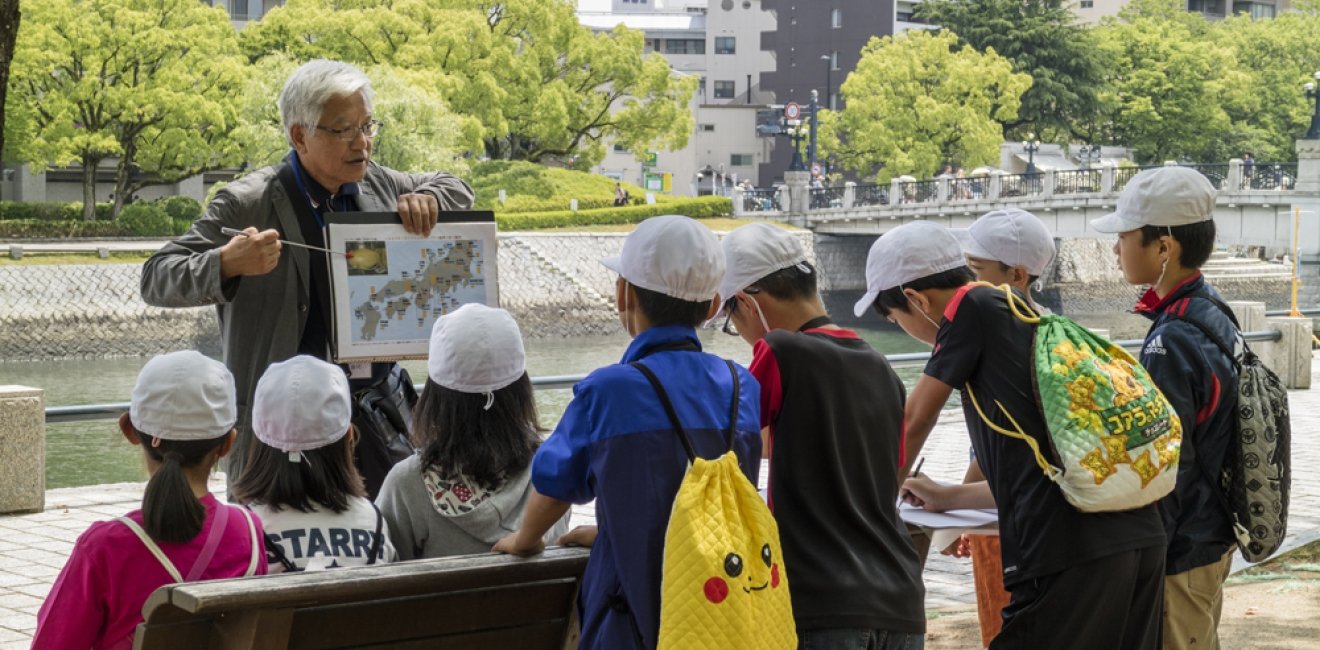
A blog of the Indo-Pacific Program
Peace studies isn’t a phrase that gets bandied about much in U.S. media, especially when it comes to remembering the past. For Americans, remembrance of the Second World War in particular is an opportunity to hail the bravery of the greatest generation, and to celebrate the leadership of the United States in bringing about peace and stability in the aftermath of global conflict.
It’s a sharp contrast to how war is remembered in Japan. In Hiroshima, for instance, the municipal government continues to build on its tradition of preparing “peace studies notebooks” at the elementary, middle, and high school levels which all students are required to study each year. The curriculum at the youngest level ensures that children are able to identify personally with the victims of the nuclear bomb and focus on developing empathy for those who perished and those who still suffer from the trauma of war. The program then builds on that ability to connect with the past by expanding into the history of the war, and to discuss the unique role that Hiroshima has as the world’s first city to be struck by a nuclear bomb to ensure that history does not repeat itself. There are still about 160,000 people nationwide who continue to receive nuclear bombing victims’ compensation from the Japanese government, with about 70,000 living in the Hiroshima area. No U.S. funding has been offered to compensate for the victims.
Yet even in Hiroshima, which is so immersed in the anti-nuclear movement and so strongly committed to being ground zero of peace studies, the fact that Japan is facing increasing security threats beyond its borders has not been lost. In the high school curriculum of peace studies, for example, the textbook delves into assessing the latest efforts to denuclearize North Korea, and the role of international consensus in ensuring non-proliferation.
Granted, Japanese appetite for the country to become a nuclear power itself in light of growing regional threats remains incredibly weak. At the same time, there is growing recognition that 73 years since the end of World War II, the regional and international realities facing Japan have changed significantly. Certainly, the fact that the number of Hiroshima and Nagasaki survivors, and survivors of the war in general, is falling rapidly is weighing heavily on those committed to promoting Japan as a leader of pacifism.
The fact that Japan will have a new sovereign next year as Emperor Akihito steps down to make way for his son, Crown Prince Naruhito, will also lead to a shift in how Japan regards its own history and its role in the world. As the son of Emperor Hirohito, Akihito has been saddled with the burden of personifying Japan’s aggressive historical legacy. Yet within Japan, the emperor has come to be greatly respected during his 30-year reign for his contrition, as he made a point of traveling to countries that had suffered under brutal Japanese occupation and to apologize for the aggressions of the Imperial Army, unlike most Japanese political leaders. Akihito did not shy away from that role in his latest speech to commemorate the war dead this year on August 15, when his father formally declared that Japan had surrendered to the United States, by stating it was important to reflect on the wrongs done as well as the suffering during the war.
As the number of first-hand witnesses of war die out on the one hand and the external threats to Japanese security increase, a shift away from staunch pacifism may be inevitable. The fact that Prime Minister Abe has stepped up efforts to amend the constitution once again this month is certainly a reflection of those changing realities. At the same time, however, without Japan stepping up efforts to educate and reflect on its aggressions across Asia, Tokyo risks the danger of only adding to regional instability, rather than securing continued peace.
Image: picturepartners / Shutterstock.com
Follow Shihoko Goto, senior associate for Northeast Asia, on Twitter @GotoEastAsia.
The views expressed are the author's alone, and do not represent the views of the U.S. Government or the Wilson Center. Copyright 2018, Asia Program. All rights reserved.
Author


Indo-Pacific Program
The Indo-Pacific Program promotes policy debate and intellectual discussions on US interests in the Asia-Pacific as well as political, economic, security, and social issues relating to the world’s most populous and economically dynamic region. Read more





